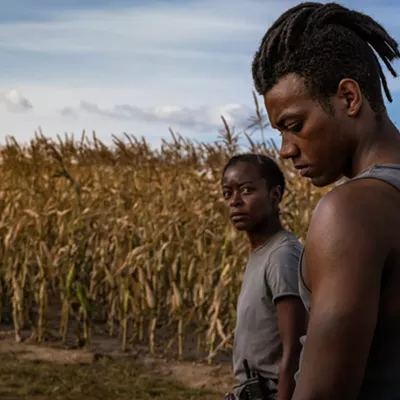A series of cuts -- back and forth in time and place - starts off this well-meaning but too-dense study of wrongdoing in contemporary Africa. The first scene shows husband and wife Justin and Tessa (Ralph Fiennes and Rachel Weisz) at an airport in Kenya, where he's seeing her and her African co-worker Arnold (Hubert Kounde) off for "a couple of days." Cut to the remnants of a car accident. Cut to the offices of the British High Commission, where he's a diplomat and who's watering his plants. (Doing so three or four times over the course of movie justifies its title?) Then Justin is given some very bad news about his wife.
The next cut is a big one -- a flashback that chronicles their first meeting as he was giving a pro-government speech and she was heckling him from the audience. Aha! She's an anti-war rabble-rouser!
Cut to them chatting, then to the bedroom, where she tells him, "I feel safe with you," then, ironically, to him identifying her charred body in a morgue, and finally to the day - before they were married - when she says she wants to go to Africa with him.
It's all a little dizzying, but director Fernando Meirelles (City of God) at least manages to keep it coherent. And then the questions begin. The most important, at this juncture, is what was she doing out there with Arnold? The second question involves her fidelity, or lack of it. A third question concerns the whereabouts of Arnold. Tessa was killed with her driver, yet Arnold was not on the scene.
So begins the newest translation of a John le Carre novel to the screen. They haven't always worked. The most successful one remains The Spy Who Came in from the Cold, back in 1965. The best is 2001's The Tailor of Panama, in which Pierce Brosnan played against type to perfection. This adaptation isn't as successful. Not having read the book, I don't know where to put the blame.
Part of the problem is trying to decide whether or not the two main characters are likable. Weisz plays Tessa as a do-gooder and troublemaker to the point of being annoying. Her character is clouded by the plot's insistence on keeping her agenda a secret. If viewers had known earlier on what she was up to, we might have better understood her actions. And Fiennes' Justin is too willing to be walked on -- to let her do anything without questioning her intentions. And he only gets slightly riled when he thinks she might be cheating on him. If only he stood up for himself and insisted on knowing what Tessa's cause is, he might have been easier to take.
There's no problem with the acting from either Fiennes or Weisz - both are near or at the top of their game, as are Kounde as Arnold and Danny Huston as their pal Sandy. (In fact, Fiennes pretty much carries the film through the different looks on his face.) It's just that even as the characters, as written, fail to pull us into their corners, the film's main story -- big government bribes and pharmaceutical companies using poor Africans as guinea pigs in drug tests - keeps having layers placed upon it, involving more and more people at different levels of government and business.
The filmmakers cram in more questions, more mystery, more paranoia. Shaky hand-held cameras add intimacy and intensity. Eventually we find out what happened to Arnold and to Tessa. But the film skimps on Justin's character development. When he says, "I have to finish what she started," his character is changing too quickly to be credible. You're left wondering what led him to that breaking point.
Still, the plot of The Constant Gardener has an intriguing edge to it, and there's little doubt that deadly shenanigans such as portrayed here do exist in the world. The film works best when casually showing the culture shock of white golfers playing on a pristine course situated right next to an overcrowded shantytown. But near the end, the film uses a short-cut plot device - tribal warriors on horseback - to move the plot along. Where the hell did they come from?
The Constant Gardener, rated: R; directed by Fernando Meirelles ; starring Ralph Fiennes, Rachel Weisz.













